By Yonathan Listik · Tuesday, March 12, 2013
As an occasional feature on TELOSscope, we highlight a past Telos article whose critical insights continue to illuminate our thinking and challenge our assumptions. Today, Yonathan Listik looks at Jürgen Habermas’s “On Social Identity,” from Telos 19 (Spring 1974).
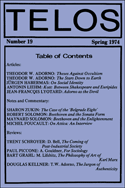 Jürgen Habermas’s objective in “On Social Identity” is clearly defending the usage of instrumental rationality toward the development of a universal morality. For Habermas, the new social identity should be constructed through universalistic moral systems, thereby eliminating possible frictions or incoherence present in modern society. The obsolescence of the state and its replacement by autonomous means of identity construction, such as art, already point to his emphasis on a more particular form of identity construction. Jürgen Habermas’s objective in “On Social Identity” is clearly defending the usage of instrumental rationality toward the development of a universal morality. For Habermas, the new social identity should be constructed through universalistic moral systems, thereby eliminating possible frictions or incoherence present in modern society. The obsolescence of the state and its replacement by autonomous means of identity construction, such as art, already point to his emphasis on a more particular form of identity construction.
Continue reading →
By J. F. Dorahy · Tuesday, March 5, 2013 As an occasional feature on TELOSscope, we highlight a past Telos article whose critical insights continue to illuminate our thinking and challenge our assumptions. Today, J.F. Dorahy looks at György Márkus’s “The Soul and Life: The Young Lukács and the Problem of Culture,” from Telos 32 (Summer 1977).
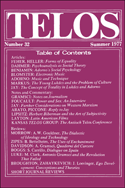 György Márkus’s essay on Lukács, “The Soul and Life,” is a seminal insight into one of the most influential philosophical oeuvres of the twentieth century. This piece, published at a time when only a handful of Márkus’s papers were available to English-language readers, reflects an intimacy with Lukács’s aesthetics that is unsurpassed in Lukács scholarship. (Márkus jointly edited, along with Frank Benesler, Lukács’s posthumously published Heidelberger Philosophie der Kunst 1916–18 and the Heidelberger Ästhetik 1916–1918, works that figure prominently in the essay under consideration.) The discussion in “The Soul and Life” centers on the problem of the possibility of culture as treated by Lukács in his pre-1918, or pre-Marxist, writings. György Márkus’s essay on Lukács, “The Soul and Life,” is a seminal insight into one of the most influential philosophical oeuvres of the twentieth century. This piece, published at a time when only a handful of Márkus’s papers were available to English-language readers, reflects an intimacy with Lukács’s aesthetics that is unsurpassed in Lukács scholarship. (Márkus jointly edited, along with Frank Benesler, Lukács’s posthumously published Heidelberger Philosophie der Kunst 1916–18 and the Heidelberger Ästhetik 1916–1918, works that figure prominently in the essay under consideration.) The discussion in “The Soul and Life” centers on the problem of the possibility of culture as treated by Lukács in his pre-1918, or pre-Marxist, writings.
Continue reading →
By Maja Sidzinska · Tuesday, February 26, 2013 As an occasional feature on TELOSscope, we highlight a past Telos article whose critical insights continue to illuminate our thinking and challenge our assumptions. Today, Maja Sidzinska looks at James Kalb’s “Liberalism: Ideal and Reality,” from Telos 122 (Winter 2002).
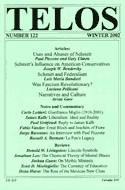 James Kalb bluntly asks us: “Why does liberalism—the tradition that makes equal freedom the political touchstone—combine such strength with such incoherence? . . . Liberalism is triumphant almost everywhere, but its victory reverses the meaning of its principles. It calls for live-and-let-live, and enforces it by supervising everything” (111). Kalb explores the inherent tension between what he regards as the two core principles of liberalism—freedom and equality. Here, freedom is interpreted as the potential or ability to carry out one’s will, while equality is understood as the principle that ensures the right of each individual to do so. But what happens when two individuals’ wills are in conflict? Logically, liberalism has few intrinsic means to resolve such a scenario, argues Kalb. It simply “resolves disputes by letting each do as he likes consistent with the equal freedom of others, and in case of conflict the more tolerant wins” (117). In this case, “more tolerant” appears to refer to that stance which is less intrusive on the will, person, or property of another. James Kalb bluntly asks us: “Why does liberalism—the tradition that makes equal freedom the political touchstone—combine such strength with such incoherence? . . . Liberalism is triumphant almost everywhere, but its victory reverses the meaning of its principles. It calls for live-and-let-live, and enforces it by supervising everything” (111). Kalb explores the inherent tension between what he regards as the two core principles of liberalism—freedom and equality. Here, freedom is interpreted as the potential or ability to carry out one’s will, while equality is understood as the principle that ensures the right of each individual to do so. But what happens when two individuals’ wills are in conflict? Logically, liberalism has few intrinsic means to resolve such a scenario, argues Kalb. It simply “resolves disputes by letting each do as he likes consistent with the equal freedom of others, and in case of conflict the more tolerant wins” (117). In this case, “more tolerant” appears to refer to that stance which is less intrusive on the will, person, or property of another.
Continue reading →
By Maja Sidzinska · Tuesday, February 5, 2013 As an occasional feature on TELOSscope, we highlight a past Telos article whose critical insights continue to illuminate our thinking and challenge our assumptions. Today, Maja Sidzinska looks at Guenther Roth’s “Durkheim and the Principles of 1789: The Issue of Gender Equality,” from Telos 82 (Winter 1989).
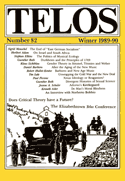 Guenther Roth positively establishes that the principles of 1789—liberté, egalité, fraternité—have been overridden by Émile Durkheim’s essentializing gender prescriptions in the service of social stability. He shows that mutually exclusive and unequal gender roles were central to Durkheim’s theory of organic solidarity. But Roth’s examination does more than just explain theoretical contradictions present in Durkheim’s work. His inquiry invites new investigations into Durkheim’s gender politics, the most intriguing one provoked by his comparative treatment of Durkheim’s and Marianne Weber’s perspectives on marriage and divorce. These contemporaries shared a political outlook yet diverged greatly in their ultimate directives for society. Guenther Roth positively establishes that the principles of 1789—liberté, egalité, fraternité—have been overridden by Émile Durkheim’s essentializing gender prescriptions in the service of social stability. He shows that mutually exclusive and unequal gender roles were central to Durkheim’s theory of organic solidarity. But Roth’s examination does more than just explain theoretical contradictions present in Durkheim’s work. His inquiry invites new investigations into Durkheim’s gender politics, the most intriguing one provoked by his comparative treatment of Durkheim’s and Marianne Weber’s perspectives on marriage and divorce. These contemporaries shared a political outlook yet diverged greatly in their ultimate directives for society.
Continue reading →
By Yonathan Listik · Tuesday, January 29, 2013 As an occasional feature on TELOSscope, we highlight a past Telos article whose critical insights continue to illuminate our thinking and challenge our assumptions. Today, Yonathan Listik looks Norbert Elias’s “Civilization and Violence: On the State Monopoly of Physical Violence and its Infringements,” from Telos 54 (Winter 1982).
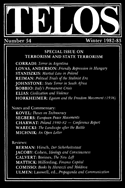 Norbert Elias’s argument in “Civilization and Violence: On the State Monopoly of Physical Violence and its Infringements” is especially helpful for understanding the developments of terrorism, and it also applies to contemporary phenomena such as the war on drugs. He contends that placing the monopoly of violence in the hands of the state comes from a desire of harmonization. The assumption is that stability depends on an imposed self-discipline. That is, the state represents the interests of the collective and should provide for it. This is very enlightening considering the assumptions in the “war on drugs.” Norbert Elias’s argument in “Civilization and Violence: On the State Monopoly of Physical Violence and its Infringements” is especially helpful for understanding the developments of terrorism, and it also applies to contemporary phenomena such as the war on drugs. He contends that placing the monopoly of violence in the hands of the state comes from a desire of harmonization. The assumption is that stability depends on an imposed self-discipline. That is, the state represents the interests of the collective and should provide for it. This is very enlightening considering the assumptions in the “war on drugs.”
Continue reading →
By Juan Carlos Donado · Tuesday, January 22, 2013 As an occasional feature on TELOSscope, we highlight a past Telos article whose critical insights continue to illuminate our thinking and challenge our assumptions. Today, Juan Carlos Donado looks at Carl Schmitt’s “The Age of Neutralizations and Depoliticizations,” from Telos 96 (Summer 1993).
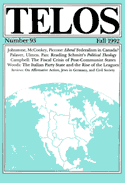 Perhaps Carl Schmitt would agree: more than ever before, we live today immersed within the spirit of technicity. Coined by Schmitt, the notion of the spirit of technicity serves the analytical purpose of allowing him to distinguish between the belief in technology and technology itself. Whereas technology signals the factual development of mechanistic progress and its link to natural science, the spirit of technicity, in Schmitt’s own words, is “perhaps an evil and demonic spirit, but not one which can be dismissed as mechanistic and attributed to technology” (141). Perhaps Carl Schmitt would agree: more than ever before, we live today immersed within the spirit of technicity. Coined by Schmitt, the notion of the spirit of technicity serves the analytical purpose of allowing him to distinguish between the belief in technology and technology itself. Whereas technology signals the factual development of mechanistic progress and its link to natural science, the spirit of technicity, in Schmitt’s own words, is “perhaps an evil and demonic spirit, but not one which can be dismissed as mechanistic and attributed to technology” (141).
Continue reading →
|
|
 Jürgen Habermas’s objective in “On Social Identity” is clearly defending the usage of instrumental rationality toward the development of a universal morality. For Habermas, the new social identity should be constructed through universalistic moral systems, thereby eliminating possible frictions or incoherence present in modern society. The obsolescence of the state and its replacement by autonomous means of identity construction, such as art, already point to his emphasis on a more particular form of identity construction.
Jürgen Habermas’s objective in “On Social Identity” is clearly defending the usage of instrumental rationality toward the development of a universal morality. For Habermas, the new social identity should be constructed through universalistic moral systems, thereby eliminating possible frictions or incoherence present in modern society. The obsolescence of the state and its replacement by autonomous means of identity construction, such as art, already point to his emphasis on a more particular form of identity construction.  György Márkus’s essay on Lukács, “The Soul and Life,” is a seminal insight into one of the most influential philosophical oeuvres of the twentieth century. This piece, published at a time when only a handful of Márkus’s papers were available to English-language readers, reflects an intimacy with Lukács’s aesthetics that is unsurpassed in Lukács scholarship. (Márkus jointly edited, along with Frank Benesler, Lukács’s posthumously published Heidelberger Philosophie der Kunst 1916–18 and the Heidelberger Ästhetik 1916–1918, works that figure prominently in the essay under consideration.) The discussion in “The Soul and Life” centers on the problem of the possibility of culture as treated by Lukács in his pre-1918, or pre-Marxist, writings.
György Márkus’s essay on Lukács, “The Soul and Life,” is a seminal insight into one of the most influential philosophical oeuvres of the twentieth century. This piece, published at a time when only a handful of Márkus’s papers were available to English-language readers, reflects an intimacy with Lukács’s aesthetics that is unsurpassed in Lukács scholarship. (Márkus jointly edited, along with Frank Benesler, Lukács’s posthumously published Heidelberger Philosophie der Kunst 1916–18 and the Heidelberger Ästhetik 1916–1918, works that figure prominently in the essay under consideration.) The discussion in “The Soul and Life” centers on the problem of the possibility of culture as treated by Lukács in his pre-1918, or pre-Marxist, writings.  James Kalb bluntly asks us: “Why does liberalism—the tradition that makes equal freedom the political touchstone—combine such strength with such incoherence? . . . Liberalism is triumphant almost everywhere, but its victory reverses the meaning of its principles. It calls for live-and-let-live, and enforces it by supervising everything” (111). Kalb explores the inherent tension between what he regards as the two core principles of liberalism—freedom and equality. Here, freedom is interpreted as the potential or ability to carry out one’s will, while equality is understood as the principle that ensures the right of each individual to do so. But what happens when two individuals’ wills are in conflict? Logically, liberalism has few intrinsic means to resolve such a scenario, argues Kalb. It simply “resolves disputes by letting each do as he likes consistent with the equal freedom of others, and in case of conflict the more tolerant wins” (117). In this case, “more tolerant” appears to refer to that stance which is less intrusive on the will, person, or property of another.
James Kalb bluntly asks us: “Why does liberalism—the tradition that makes equal freedom the political touchstone—combine such strength with such incoherence? . . . Liberalism is triumphant almost everywhere, but its victory reverses the meaning of its principles. It calls for live-and-let-live, and enforces it by supervising everything” (111). Kalb explores the inherent tension between what he regards as the two core principles of liberalism—freedom and equality. Here, freedom is interpreted as the potential or ability to carry out one’s will, while equality is understood as the principle that ensures the right of each individual to do so. But what happens when two individuals’ wills are in conflict? Logically, liberalism has few intrinsic means to resolve such a scenario, argues Kalb. It simply “resolves disputes by letting each do as he likes consistent with the equal freedom of others, and in case of conflict the more tolerant wins” (117). In this case, “more tolerant” appears to refer to that stance which is less intrusive on the will, person, or property of another.  Guenther Roth positively establishes that the principles of 1789—liberté, egalité, fraternité—have been overridden by Émile Durkheim’s essentializing gender prescriptions in the service of social stability. He shows that mutually exclusive and unequal gender roles were central to Durkheim’s theory of organic solidarity. But Roth’s examination does more than just explain theoretical contradictions present in Durkheim’s work. His inquiry invites new investigations into Durkheim’s gender politics, the most intriguing one provoked by his comparative treatment of Durkheim’s and Marianne Weber’s perspectives on marriage and divorce. These contemporaries shared a political outlook yet diverged greatly in their ultimate directives for society.
Guenther Roth positively establishes that the principles of 1789—liberté, egalité, fraternité—have been overridden by Émile Durkheim’s essentializing gender prescriptions in the service of social stability. He shows that mutually exclusive and unequal gender roles were central to Durkheim’s theory of organic solidarity. But Roth’s examination does more than just explain theoretical contradictions present in Durkheim’s work. His inquiry invites new investigations into Durkheim’s gender politics, the most intriguing one provoked by his comparative treatment of Durkheim’s and Marianne Weber’s perspectives on marriage and divorce. These contemporaries shared a political outlook yet diverged greatly in their ultimate directives for society.  Norbert Elias’s argument in “Civilization and Violence: On the State Monopoly of Physical Violence and its Infringements” is especially helpful for understanding the developments of terrorism, and it also applies to contemporary phenomena such as the war on drugs. He contends that placing the monopoly of violence in the hands of the state comes from a desire of harmonization. The assumption is that stability depends on an imposed self-discipline. That is, the state represents the interests of the collective and should provide for it. This is very enlightening considering the assumptions in the “war on drugs.”
Norbert Elias’s argument in “Civilization and Violence: On the State Monopoly of Physical Violence and its Infringements” is especially helpful for understanding the developments of terrorism, and it also applies to contemporary phenomena such as the war on drugs. He contends that placing the monopoly of violence in the hands of the state comes from a desire of harmonization. The assumption is that stability depends on an imposed self-discipline. That is, the state represents the interests of the collective and should provide for it. This is very enlightening considering the assumptions in the “war on drugs.”  Perhaps Carl Schmitt would agree: more than ever before, we live today immersed within the spirit of technicity. Coined by Schmitt, the notion of the spirit of technicity serves the analytical purpose of allowing him to distinguish between the belief in technology and technology itself. Whereas technology signals the factual development of mechanistic progress and its link to natural science, the spirit of technicity, in Schmitt’s own words, is “perhaps an evil and demonic spirit, but not one which can be dismissed as mechanistic and attributed to technology” (141).
Perhaps Carl Schmitt would agree: more than ever before, we live today immersed within the spirit of technicity. Coined by Schmitt, the notion of the spirit of technicity serves the analytical purpose of allowing him to distinguish between the belief in technology and technology itself. Whereas technology signals the factual development of mechanistic progress and its link to natural science, the spirit of technicity, in Schmitt’s own words, is “perhaps an evil and demonic spirit, but not one which can be dismissed as mechanistic and attributed to technology” (141). 

